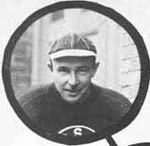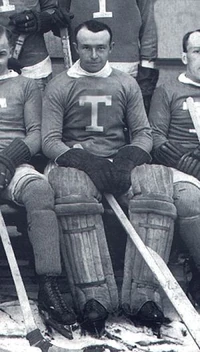Fanofpucks (talk | contribs) |
Fanofpucks (talk | contribs) No edit summary |
||
| Line 10: | Line 10: | ||
| nationality = CAN |
| nationality = CAN |
||
| birth_date = February 21, 1892 |
| birth_date = February 21, 1892 |
||
| − | | birth_place = [Aurora]], [[Ontario]] |
+ | | birth_place = [[Aurora]], [[Ontario]] |
| death_date = June 27, 1941 |
| death_date = June 27, 1941 |
||
| death_place = ''place unknown'' |
| death_place = ''place unknown'' |
||
Revision as of 16:02, 16 June 2009
| Hap Holmes | |

| |
| Position | Goaltender |
| Caught | Left |
| Height Weight |
5 ft 10 in (1.78 m) 170 lb (77 kg) |
| Teams | Toronto Blueshirts (NHA) Seattle Metropolitans (PCHA) Toronto Arenas (NHL) Victoria Cougars (WCHL/WHL) Detroit Cougars (NHL) |
| Nationality | CAN |
| Born | February 21, 1892, Aurora, Ontario |
| Died | June 27, 1941, place unknown |
| Pro Career | 1912 – 1928 |
| Hall of Fame, 1972 | |
Harry "Hap" Holmes (February 21, 1892 – June 27, 1941) was a Canadian professional goaltender. As a professional, Holmes won the Stanley Cup four times, with four different teams.
Holmes played as an amateur for three season with the Parkdale Canoe Club of the Ontario Hockey Association (OHA) from 1908 to 1911, before joining the professional Toronto Blueshirts of the National Hockey Association (NHA) in 1912–13.
He died on June 27, 1941 and was inducted into the Hockey Hall of Fame in 1972.
Professional career
Toronto Blueshirts

Holmes, with the Blueshirts
Holmes began his professional career playing for the Toronto Blueshirts of the National Hockey Association (NHA) in 1912–13. Holmes played with the Blueshirts for three seasons. In his first season with the Blueshirts, Holmes had a 6–7 record over 15 games with a shutout, for a 4.47 goals-against average. The Blueshirts ended up missing the playoffs in the 1913–14 season, Holmes' second with the Blueshirts, in which he won the Stanley Cup for the first time. It was the first time a Toronto-based team won the Stanley Cup. In the NHA playoffs, Holmes won one out of two games, but ended with a 1.00 goals-against average and one shutout; in the Stanley Cup final, Holmes won all three games and finished with a 2.59 goals-against average. The next season, the Blueshirts missed the playoffs, as Holmes had only eight victories over 20 games, ending up with a 4.18 goals-against average.
First stint with the Seattle Metropolitans
In the 1915–16 season, Holmes signed with the Seattle Metropolitans of the Pacific Coast Hockey Association (PCHA), although he was still under contract to the Blueshirts. In his first season with the Metropolitans, Holmes played 18 games. He finished with a 9–9 record, with no shutouts and a 3.67 goals-against average. That season, the Metropolitans missed the playoffs. In his sophomore season, Holmes posted a 16–8 record over 24 games, with two shutouts and a 3.28 goals-against average. In the Stanley Cup finals, Holmes posted a 3–1 record with a 2.75 goals-against average, en route to the Metropolitans' only Stanley Cup win. The Metropolitans became the first American-based team to win the Stanley Cup.
Toronto / Toronto Arenas
In November 1917, Holmes signed as free agent with the Montreal Wanderers. The Wanderers, in turn, loaned Holmes back to Seattle on December 12, 1917. On January 4, 1918, the Metropolitans returned Holmes under loan to the Toronto Arenas, now in the newly-formed NHL. In his only full season with the Arenas, Holmes appeared in 16 regular season games, posting a 9–7 record, with a 4.73 goals-against average and no shutouts. In the NHL playoffs, Holmes played two games, winning and losing one respectively. In the Stanley Cup finals, Holmes had a 3–2 record over five games, with a 4.00 goals-against average, en route to Holmes' third Stanley Cup win. He is the only member of both Blueshirts' Stanley Cup wins. After playing only two games with Toronto the following season, surrendering nine goals in two losses, Holmes was recalled by the Metropolitans on December 27, 1918.
Second stint with the Seattle Metropolitans
In the 1918–19 season Holmes appeared in 20 regular season games for the Metropolitans–winning 11 and losing nine–with no shutouts and a 2.25 goals-against average. In the PCHL playoffs, Holmes played two games, winning and losing one apiece, and surrendering five goals in total. The Metropolitans made the Stanley Cup finals once more. Playing against the Montreal Canadiens of the National Hockey League (NHL), the series was abandoned tied at two wins apiece, because of the Spanish Influenza pandemic. Montreal could not continue the series because one of their players, Joe Hall, was severely ill with influenza; however, the Metropolitans did not wish to accept the Cup by default. Hall eventually died on April 5, 1919, five days after the end of the series, in a Seattle hospital. The only draw of the series was a scoreless affair; after playing 20 minutes of overtime, referee Mickey Ion called the game off. In the 1919–20 season, Holmes appeared in 22 games, winning 12 games, and losing 10. He finished the season with four shutouts and a 2.46 goals-against average. In the PCHL playoffs, Holmes played two games, surrendering three goals, and ending up with a loss and a win. The Metropolitans made the Stanley Cup finals for the second straight season, playing against the Ottawa Senators of the NHL. The Metropolitans lost, and Holmes posted a 2–3 record with a 3.00 goals-against average.
Holmes played the next four seasons with the Metropolitans, but failed to make the Stanley Cup final. Over that stretch, Holmes and the Metropolitans won about half the games each season. The Metropolitans missed the playoffs in only the 1922–23 season. In the 1920–21 season, Holmes appeared in 24 games. He posted a 12–11–1 record, with a 2.63 goals-against average and no shutouts. In the playoffs, he lost both games he appeared in, and let in 13 goals. The following season, he posted an identical win-loss-tie record in both the regular season. The only difference was a 2.60 goals-against average in the regular season, with four shutouts, and the reduction of his playoffs goals-against by 11 goals. In the 1922–23 season, Holmes appeared in 30 games, posting a 15–15 record, with two shutouts and a 3.45 goals-against average; however, the Metropolitans missed the playoffs that season. In the 1923–24, Holmes' last with the Metropolitans, he appeared in 30 regular-season games, posting a 14–16 record, with two shutouts and a 3.26 goals-against average. Despite an extra loss, the Metropolitans made the playoffs that season. Holmes played two games, losing one and tying one, ending up with a 1.79 goals-against average.
Victoria Cougars
In 1924–25, after Metropolitans folded and the rest of the PCHA merged with the Western Canada Hockey League (WCHL), Holmes joined the Victoria Cougars. In his first season with the Cougars, Holmes posted a 16–12 regular season record, with three shutouts and a 2.25 goals-against average. In the WCHL playoffs, Holmes was undefeated in four games. He had two wins and ties respectively, with one shutout and a 1.75 goals-against average. In the Stanley Cup final, Holmes posted a 3–1 record with a 2.00 goals-against average against the Canadiens. It was the last time a non-NHL team won the Stanley Cup. It was Holmes' fourth and last Stanley Cup victory.
The following season, Holmes had a 15–11–4 regular season record, with four shutouts a 1.68 goals-against average. In the WCHL playoffs, Holmes nearly duplicated his results from the previous season, posting a 2–0–2 record, with one shutout and a 1.45vgoals-against average. In the Stanley Cup final, the Cougars lost the series 3–1 against the Montreal Maroons. That marked the last time a non-NHL team appeared in the Stanley Cup finals, as the WCHL folded after the 1926 Stanley Cup final, and its players were absorbed by the NHL. It was Holmes' seventh and final Stanley Cup final appearance.
Detroit Cougars
A new NHL franchise in Detroit bought the rights to the Victoria Cougars players, and named the team the Cougars. Holmes played his last two professional seasons with Detroit Cougars. Holmes, playing for Detroit, posted 17 shutouts in 85 appearances. Detroit failed to make the playoffs in both of Holmes' seasons with them, as Holmes only won 30 of his 85 appearances. In Holmes' first season with Detroit, he posted an 11–26–4 record, over 41 games played. Holmes had six shutouts and overall, his goals-against average that season was 2.23. In the 1927–28 season, Holmes' final one as a professional player, he appeared in all 44 of Detroit's games. He posted a 19–19–6 record, with 11 shutouts and a 1.73 goals-against average.
Playing style
As a player, Holmes wore a baseball cap in net to protect his head from spectators spitting tobacco or throwing other objects at it. Holmes was bald, and his head presented a tempting target. Holmes played a stand-up style, and relied on proper positioning to stop the puck. Holmes' play was consistent, and he was relaxed and nonchalant in the nets, leading some to describe his play as almost lazy.
Post-retirement
After his playing career, Holmes coached minor-league teams. He coached the Toronto Millionaires, of the Canadian Professional Hockey League (CPHL) to a 19–6–7 record in the 1928–29 season, and the Cleveland Indians of the International Hockey League (IHL) to a 24–18–6 record in the 1930–31 season. The American Hockey League (AHL) named their award for the top goaltender, the Harry "Hap" Holmes Memorial Award , after him. Holmes died on June 27, 1941. He was inducted posthumously into the Hockey Hall of Fame in 1972.
External links
| This page uses content from Wikipedia. The original article was at Hap Holmes. The list of authors can be seen in the page history. As with Ice Hockey Wiki, the text of Wikipedia is available under the Creative Commons Attribution-Share Alike License 3.0 (Unported) (CC-BY-SA). |
